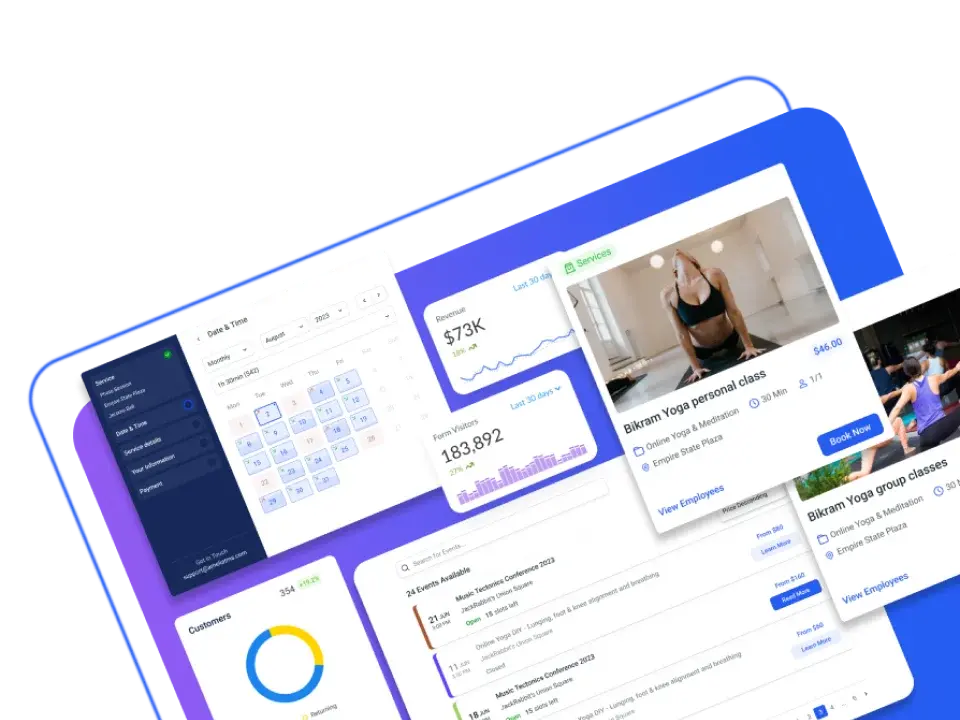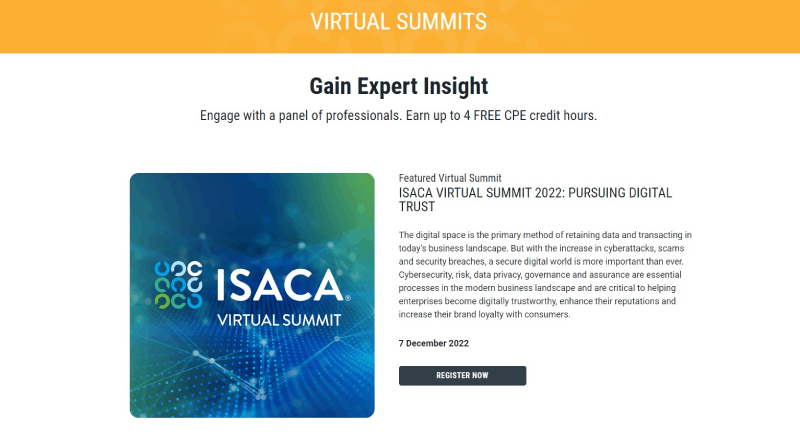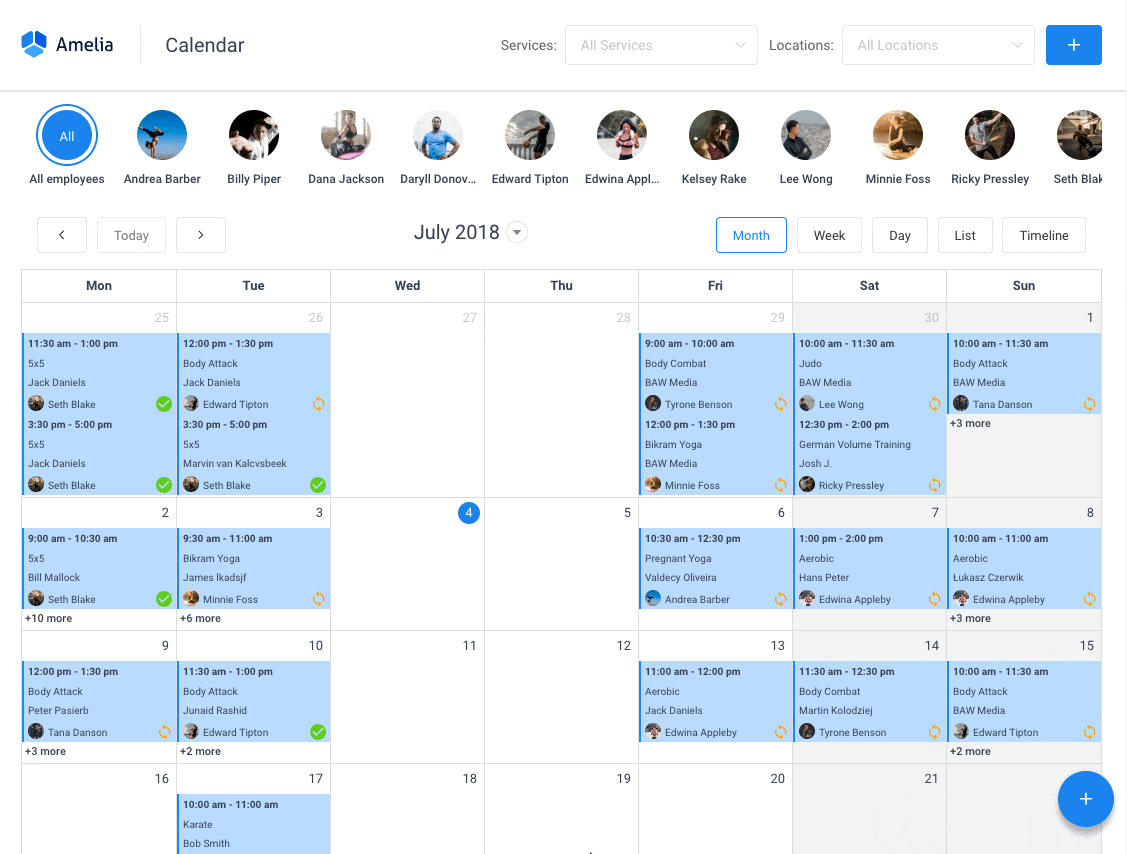Many event organizers had to learn to host virtual events during the pandemic. Yet, this doesn’t mean that these are easy to organize. Promoting audience participation is difficult, and it’s even more challenging when talking about an online event. So, if you want to be above your competitors, you’ll need to learn some of the best practices in the industry. If you combine this with your creativity, you’ll be unstoppable.
While many people struggle to host the perfect online event, others don’t even know the difference between these and traditional gatherings. Moreover, you have to consider that there are various types of virtual events. Some events may work better with certain businesses, but there’s one thing all event planners want: success.
There is no magic formula to achieve this, but you can follow certain guidelines to help you. In this guide, you’ll find the different types of virtual events and tips on how to organize them.
Virtual Event Definition
Firstly, it’s essential to answer three questions: “What,” “why,” and “how”.
What is a virtual event? Unlike in-person events, virtual events are transmitted online. Through the web, participants get together and discuss, interact, or collaborate.
Why hold a virtual event? The main reason why someone would set up a virtual event platform is simplicity. This is a straightforward and cost-effective solution. Since you don’t have to rent a venue or hire staff, you’ll have fewer overhead costs.
How do you hold an online event? Unlike other types of events, virtual conferences and webinars don’t require much expertise. You won’t need any special equipment either. Another great advantage is that attendance is unlimited. This gives brands a chance to widen their reach.
Types of Virtual Events
Virtual Summits and Virtual Conferences
Holding your conferences online might be a good idea, especially for a company. Speakers, participants, presenters, and guests can participate from any part of the world. Aside from allowing significant savings, it will let you reach a wider audience. Moreover, international players give more status to your online event.
You can send access in advance and record the sessions. Thus, you promote attendee engagement by making the recordings available after the event.
Organize a virtual conference to hold large company-wide events in multi-track or multi-day formats. You’ll also create brand awareness and generate more leads. Community building is another great plus.
Virtual conferences are very popular because they bring excellent results. Presenting keynote speakers and reaching more people are some of the advantages of conferences. Unlike other types of virtual events, this option is great for marketing purposes.
Online Trade Shows and Virtual Exhibitions
Holding in-person conferences is becoming more and more expensive. Not to mention that you have to invest a lot of time to organize them. Luckily, virtual trade shows offer a great solution.
Perfect for companies on a budget, online trade shows allow you to interact with your event attendees in real time. Being less expensive than traditional options, this is a great alternative to optimize your efforts.
Webinars
Webinars are the most common among different types of virtual events. Choose any topic of your interest and you’ll find a webinar virtually every day of the week. You can find out about them from your social media platforms, your mailbox, or different advertisement means.
Webinars offer more benefits than in-person events, as you can reach a wider audience. For many people, it’s easier to attend virtually than to commute to a location; they spend less money and save time. Also, virtual attendees can ask questions anonymously, and hosts can provide answers.
These types of virtual events are perfect for single-track education. When you host a webinar, you can limit the interaction with the target audience. This approach is different from training sessions or meetings, and thus it’s ideal for particular purposes. This includes lectures, panel discussions, tutorials, and product presentations.
Launching Virtual Products
These events can help you present your products creatively. Virtual launches are an exciting way to release your latest product to the market. You won’t regret using this powerful tool to reach your target audience.
If there’s a secret element in your product, you can leverage it on your social media profiles. Release daily posts revealing some of the secrets and create expectations.
By choosing this approach, you’ll create an impact on your virtual attendees that will certainly last. There are many other strategies to follow, but this one is great when introducing a new product.
Internal Hybrid Events
Hybrid events are useful for companies with employees in different regions. Some examples of these types of virtual events are sales kick-offs, town halls, and company-wide events. With one of these, you can span different countries and share a message with your entire corporation.
Paying for the flights for every one of your employees would be too expensive; thus, internal hybrid events are a great solution. With a combination of in-person and virtual attendees, you can achieve your goals.
Wedding Expo Virtual Event
Everyone knows that weddings are hard to organize. Besides booking the venue, you’ll have to hire caterers and decorate the place accordingly. There will be many vendors involved, which can get complicated. Thus, virtual wedding expos are a great way to find everything you need under one roof.
Event organizers can find musicians, caterers, designers, decorators, photographers, and other professionals. Moreover, you can find them and hire them with just one click.
Question and Answer Sessions With Influencers
In our day, consumers are subject to many distractions and usually spend much of their time working. Thus, it’s vital to engage attendees so that they participate in your virtual event.
Inviting an expert is a great idea to create enthusiasm and attract more people. Another alternative is to invite a celebrity for a question-and-answer session. Moreover, the virtual event platforms available today make this much easier to organize.
Keep in mind that this approach allows you to create a personal connection with your audience. This can only translate into benefits for your brand.
Types of Virtual Events: Concerts
An online event like a music concert can be appealing. Even in 2022, they have been quite popular, and the reason is simple: people from all over the world can listen to their favorite artists.
Previously, only fans from the U.K., the U.S., or Canada could enjoy these experiences, but now things are different. Also, several musicians can get together in one virtual environment.
Online concerts can be a great way to raise money. You can use these for solidarity purposes through initiatives like One World.
Sell more event tickets with the right tool for the job
Staying organized has never been easier.
You can now manage your business and grow your brand with a single, powerful WordPress booking plugin that keeps all of your appointments or event bookings in line, your clients organized and your business booming.
Amelia is an events plugin for business owners who need to streamline their booking experience both for their staff and their clients.
Amelia handles everything for you, even sending automated email or SMS reminders to your clients. No-shows? Not anymore!
The Amelia WordPress booking plugin adapts to different industries for a blissful online booking experience and employee management.
Want to know more? Check out Amelia’s awesome features to see what you are missing.
Virtual Networking Events
Although these are not large events, they are important. Connections are key to hosting a successful virtual event, and thus networking becomes essential.
Host a “happy hour” event for your staff and see how many benefits it brings. Besides promoting camaraderie, these virtual events can be an icebreaker and can strengthen the bonds within your team.
However, keep in mind that this is more than a simple gathering. While companies use it to host parties, universities create virtual campuses.
Virtual Exhibitions
These types of virtual events are great for any business. They bring benefits to every participant. With these events, you provide a virtual space where attendee networking is possible. Also, marketers and organizers can have an enhanced experience that provides value.
Undoubtedly, with a virtual experience like this, you can attract more people and expand your reach.
Job Fair Virtual Events
Job and career fairs are excellent places to boost your professional development. When these are held as virtual events, you can attend without the hassle of traveling and with zero expenses.
While traditional career fairs have lots of people rushing from one booth to another, virtual fairs are much simpler. Forget about dressing up and decrease the level of stress that these fairs usually entail. Take the next big opportunity through a virtual job fair.
Types of Virtual Events: Debates
Two people can have a debate without meeting in the same physical place. Whether the debate is traditional or innovative, the virtual format is quite appealing. The online platform even allows attendees to vote at any time.
Also, you can keep track of who is winning, and the debate can go on independently from these factors. No matter how many people disagree, the numbers will speak for themselves and help you constitute an excellent virtual environment.
Types of Virtual Events: Fundraisers
If you have a nonprofit organization, nonprofit fundraising is a part of your regular event schedule. Imagine the benefits of holding this event virtually.
Fundraisers can have different formats and accept various types of virtual events. For instance, you can host an informational or entertainment event and use interactive tools. It will be easier for attendees to participate online, and hence, they will be more prone to collaboration.
Finally, consider donating part of your earnings to the cause that you’re supporting.
FAQs about types of virtual events
1. What is a virtual conference and how does it differ from an in-person conference?
A virtual conference is a web-based gathering that mimics an actual conference. Attendees can use their own devices to take part in workshops, keynote addresses, networking events, and other activities. The fact that virtual conferences don’t require attendees to travel to a real site reduces costs and broadens accessibility. This is one of the key distinctions between virtual and in-person conferences.
2. What are the different types of virtual events and which one is best for my business needs?
Webinars, virtual conferences, trade exhibits, product launches, job fairs, and networking occasions are some of the most popular kinds of virtual events. Your goals, target market, and financial constraints will determine the kind of virtual event that is best for your organization. For instance, a virtual trade expo can be perfect for B2B companies, whereas a virtual job fair might be better for finding talent.
3. How can I make my virtual trade show more interactive and engaging for attendees?
You can include interactive components like live chats, Q&A sessions, polls, and product demos to make a virtual trade fair more interesting. To encourage visitors to stop by your booth, you can also provide virtual swag bags, prizes, and discounts. Engagement can also be raised by constructing an immersive experience using virtual reality or 360-degree video.
4. What are the benefits of hosting a virtual job fair and how can I ensure success?
Virtual job fairs give businesses an affordable method to engage with potential applicants from around the globe. By removing geographic restrictions, you may draw in a larger talent pool and shorten the hiring process.
Using a trustworthy virtual platform, providing thorough job descriptions and company information, and providing opportunities for networking and one-on-one talks with prospects are all necessary steps to success.
5. How do I create a successful virtual product launch event that generates buzz and sales?
You should use email marketing and social media efforts to build anticipation for your virtual product launch event. You can give a live demonstration of the product or show a video of it being used, offer special discounts or early access, and host an expert Q&A session during the event. In order to increase discussion and revenue, you can also nudge participants to post about their experiences on social media using a customized hashtag.
6. How can I incorporate networking opportunities into my virtual event?
Use breakout rooms or virtual lounges to encourage networking among guests by providing spaces for them to mingle and converse. Additionally, you might provide one-on-one meetings or quick networking events. Networking can be made easier after the event by encouraging guests to exchange their contact information and LinkedIn accounts.
7. What are the best virtual event platforms available on the market and how do I choose the right one for my event?
Depending on the scale, complexity, and objectives of your event, different virtual event systems are best: Amelia, Trafft, Microsoft Teams, Eventbrite, Zoom, and other well-liked solutions. Think about things like cost, functionality, security, and support when selecting a platform. It’s crucial to test the platform beforehand to make sure it will work for you.
8. How can I measure the success of my virtual event and what metrics should I be tracking?
You may monitor data like attendance, engagement, comments, and income to gauge the performance of your virtual event. To track website traffic and conversions, you can also utilize programs like Google Analytics or software designed specifically for events.
Prior to your event, it’s critical to establish clear objectives. You should also use data to assess performance and pinpoint areas in need of improvement.
9. What are some creative ideas for virtual team-building events that promote collaboration and engagement?
Activities like virtual escape rooms, trivia contests, online cookery lessons, and virtual scavenger hunts are examples of creative virtual team-building activities.
Other suggestions include online movie or book clubs, competitions between teams, and group workouts. The secret is to come up with enjoyable and interesting activities that foster teamwork, communication, and connection.
10. How can I create an immersive virtual experience that feels as engaging as an in-person event?
Utilize resources like virtual reality, 360-degree video, or augmented reality to create an immersive virtual experience. Additionally, you can add interactive components like real-time polls, Q&A sessions, or virtual booths.
Providing top-notch audio and video production can help enhance the event’s engagement. Finally, encouraging participation from attendees through interactive activities or social media can improve the overall experience and make it seem more like a live event.
A Conclusion on Different Types of Virtual Events That Actually Work
In the same way as a physical event, virtual events have certain purposes. This can be to increase lead conversion, convey a message, build loyalty, or create brand awareness.
In any case, there are different types of virtual events that you can use. Check out this guide and choose the right type according to your objectives. Then, all you need is impeccable organization and lots of creativity. With this, you’re ready to host a successful virtual event.
If you enjoyed reading this article on the types of virtual events you can organize, you should check out this one with virtual event survey questions.
We also wrote about similar topics like adding a virtual events calendar to your site, event planning tips, virtual event best practices, virtual events checklist, and event WordPress themes.




